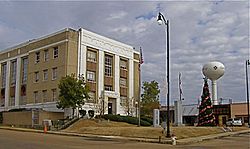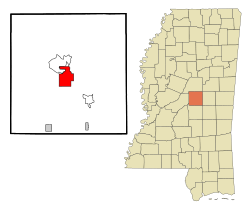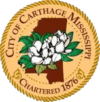Carthage, Mississippi facts for kids
Quick facts for kids
Carthage, Mississippi
|
|||
|---|---|---|---|

Leake County Courthouse in Carthage
|
|||
|
|||

Location of Carthage, Mississippi
|
|||
| Country | United States | ||
| State | Mississippi | ||
| County | Leake | ||
| Area | |||
| • Total | 9.34 sq mi (24.19 km2) | ||
| • Land | 9.29 sq mi (24.07 km2) | ||
| • Water | 0.05 sq mi (0.12 km2) | ||
| Elevation | 351 ft (107 m) | ||
| Population
(2020)
|
|||
| • Total | 4,901 | ||
| • Density | 527.39/sq mi (203.63/km2) | ||
| Time zone | UTC-6 (Central (CST)) | ||
| • Summer (DST) | UTC-5 (CDT) | ||
| ZIP code |
39051
|
||
| Area code(s) | 601 | ||
| FIPS code | 28-11780 | ||
| GNIS feature ID | 0668123 | ||
Carthage is a city in Mississippi, United States. It is the main town, or county seat, of Leake County. In 2020, about 4,901 people lived here.
Carthage is famous for its Carthage Historic District. This area includes the beautiful Leake County Courthouse. It is also home to one of the largest chicken processing plants in the world!
Contents
History of Carthage
Carthage was started in 1834. It quickly became the county seat for Leake County. The Harris family were some of the first people to settle here. They named the town after their old home, Carthage, Tennessee.
A courthouse and a jail were built in 1836. A post office opened the next year. Carthage officially became a town in 1876. The current courthouse was finished in 1939. The Carthaginian newspaper began in 1872 and is still printed today.
By 1900, farming was the main business in Leake County. The Pearl River is about 2 miles (3.2 km) south of Carthage. It was used to ship goods by steamboat to and from Jackson.
A railroad came through Carthage later, but it wasn't a huge part of the town's growth. A logging railroad was built in 1914. It was later used for regular train service until 1960.
In 1927, a newspaper called Daily Clarion Ledger wrote about Carthage. They said it was a "Good Progressive and Enterprising City". By then, Carthage had schools, churches, banks, and even a Coca-Cola bottling plant.
By 1964, the town's population was over 2,000 people. Because of this, Carthage was officially called a city. The Carthage Historic District is now on the National Register of Historic Places. This means it's a special place with important buildings.
Interestingly, Carthage, Texas was named after Carthage, Mississippi, in 1848.
Working for Equal Rights
Starting in 1948, Carthage held an event called the "Tri-Racial Goodwill Festival". This festival aimed to include all citizens. At first, people of different backgrounds were separated. But this was fixed in later years. The local newspaper said that in 1949, "friendship and goodwill fellowship permeated the air."
In the 1960s, during the Civil Rights Movement, some groups tried to make changes in Carthage. There were challenges when people tried to open a "Freedom School" to help with equal rights. Also, an NAACP worker's home was shot at in 1967. These events show the struggles people faced for fairness and equality.
Geography
Carthage covers about 9.4 square miles (24.3 square kilometers). Most of this area is land, with a small part being water.
The very center of Mississippi is located about 9 miles (14 km) west-northwest of Carthage.
Climate
Carthage has a warm climate. Summers are hot and humid, while winters are mild. The average high temperature in July is about 92.1°F (33.4°C). In January, the average low temperature is around 33.5°F (0.8°C). The city gets a good amount of rain throughout the year.
Population Details
| Historical population | |||
|---|---|---|---|
| Census | Pop. | %± | |
| 1880 | 285 | — | |
| 1890 | 322 | 13.0% | |
| 1900 | 416 | 29.2% | |
| 1910 | 315 | −24.3% | |
| 1920 | 635 | 101.6% | |
| 1930 | 998 | 57.2% | |
| 1940 | 1,766 | 77.0% | |
| 1950 | 1,925 | 9.0% | |
| 1960 | 2,442 | 26.9% | |
| 1970 | 3,031 | 24.1% | |
| 1980 | 3,453 | 13.9% | |
| 1990 | 3,819 | 10.6% | |
| 2000 | 4,637 | 21.4% | |
| 2010 | 5,075 | 9.4% | |
| 2020 | 4,901 | −3.4% | |
| U.S. Decennial Census | |||
People in Carthage (2020)
| Race | Num. | Perc. |
|---|---|---|
| White | 1,458 | 29.75% |
| Black or African American | 2,366 | 48.28% |
| Native American | 78 | 1.59% |
| Asian | 41 | 0.84% |
| Pacific Islander | 1 | 0.02% |
| Other/Mixed | 106 | 2.16% |
| Hispanic or Latino | 851 | 17.36% |
In 2020, there were 4,901 people living in Carthage. There were about 1,359 households and 1,024 families.
Economy
Carthage is home to one of the biggest chicken processing plants in the world. This plant can process 2.5 million chickens every week! It was first owned by Choctaw Maid Farms. Later, Tyson Foods bought the plant in 2003. It provides jobs for about 1,700 people.
In the mid-1990s, many Hispanic workers came to work at the plant. This caused the Hispanic population in Carthage to grow a lot.
Arts and Culture
Every May, Carthage holds an event called "The Square Affair". It's a fun festival with many activities. You can find walks and runs, a fishing rodeo for kids, and an idol singing competition. There are also vendors, fireworks, and a basketball tournament.
Parks and Recreation
Carthage has two main parks for outdoor fun:
- McMillian Park: This park has baseball fields, tennis courts, and a soccer field. It also features a disc golf course, two playgrounds, and a pond for fishing.
- Lincoln Park: Here you'll find a baseball field, a basketball court, and a walking trail. There's also a community center for gatherings.
Education
Students in Carthage attend schools in the Leake County School District. This includes Leake Central High School.
Infrastructure
Highways
Carthage is connected by several important roads. These include Mississippi Highway 35, Mississippi Highway 16, and Mississippi Highway 25.
Airport
The Carthage-Leake County Airport is located just north of the city.
Law Enforcement and Fire Services
Carthage has its own police department to keep people safe. It also has a fire department to respond to emergencies.
Notable People
Many interesting people have come from Carthage or Leake County:
- The Chambers Brothers - A famous soul music group.
- Winson Hudson - A brave civil rights activist.
- John Johnson - A professional basketball player.
- Ollie McLaughlin - A record producer and record label owner.
- Bennett Malone - A member of the Mississippi House of Representatives.
- Marcus Mann - A Southern Baptist minister and former college basketball player.
- Jay Mathis - A former member of the Mississippi House of Representatives.
- Donald Rawson - A history professor and administrator.
- Ferr Smith - A member of the Mississippi House of Representatives.
- Arthur Tate - A member of the Mississippi State Senate.
- Kenneth Walker - A member of the Mississippi House of Representatives.
- O'Neal Wilder - A World Junior gold medalist.
See also
 In Spanish: Carthage (Misisipi) para niños
In Spanish: Carthage (Misisipi) para niños
 | William M. Jackson |
 | Juan E. Gilbert |
 | Neil deGrasse Tyson |




